We choose to study what we understand least

How did you come up with the idea to compare immigrant integration policies in minority regions?
Christina Zuber: My dissertation focused on parties that represent the interests of national or ethnic minorities in multinational states – like Spain. At a conference at that time, a colleague asked whether the term "ethnic party" could actually be applied to Catalans. She said this because Catalan parties do not define nationality in ethnic terms, that is, on the basis of shared descent from common ancestors. The colleague explained that Catalans had opened up their understanding of the nation to immigrants, defining a Catalan as someone who lives and works in the region and is willing to adopt the Catalan culture and language.
The example she gave was that of a referendum in which all residents of the region were entitled to vote. The idea was that everyone who lives in the region should also be entitled to shape its future. Even if you had just arrived yesterday from Nigeria, you were still able to vote. I was fascinated by the fact that the Catalans, who defend their minority language and culture against the Spanish state, would simultaneously act so inclusively towards newcomers by opening up their national project for everyone.
What question did your project start out with?
How do national minorities who try to differentiate from the states they inhabit handle diversity? I found a few case studies, but no really good explanation for why some minority regions included migrants and others tried to exclude them. After my thesis defence, I drafted a postdoctoral project based on this question that I then submitted to the Fritz Thyssen Foundation for funding.
Project funding
The first year of the project (2013-2014) was funded by a postdoctoral fellowship from the Fritz Thyssen Foundation, which enabled Christina Zuber to conduct research in Barcelona and Bolzano. During her time as a fellow of the Institute for Advanced Study Konstanz, she then further advanced the project decisively. This "writing retreat" as she calls it, was funded through the Cluster of Excellence "Cultural Foundations of Social Integration" at the University of Konstanz from October 2016 to March 2017.
Clearly, you would focus on Catalonia as a minority region, but how did you decide to compare this region with South Tyrol?
Since I am a comparative political scientist, my approach is always comparative. This is why I chose to contrast the highly inclusive Catalan response to migration with a different one. Using the second case as a kind of control, the comparison then helps to find an explanation.
Based on my dissertation research, I was already quite familiar with European minority regions, but I still needed to find out how they responded to migration. I finally settled on South Tyrol, because the two regions share many characteristics, while treating the topic of migration in very different ways. In South Tyrol, we observe ethnic nationalism and a pronounced fear of immigration, which are clearly expressed in political discourse.
My goal was to develop a theory about how such legacies are passed on. There are a lot of legacy explanations in research on migration and citizenship, but most of the time, the mechanisms of transmitting the legacy are not spelled out so we do not get to know how this process works.
A second point was actually raised very late – during the review process: The reviewers asked about the potential for generalization. After all, we find these kinds of legacies in other policy areas, too. In the end, the project also contributed to comparative public policy research, which aims to explain policy content across different substantive areas.
What was new about your project?
When I started the project, there were two separate strands of research on minorities. The first strand covered national minorities: a population that stays in one place, but whose borders shift. One example is South Tyrol, where residents became a minority in another state after the first world war: Italy. The second strand focused on migrating people. The result was the same: People with different cultural, ethnic, religious and linguistic affiliations live within the same state borders. In my project, I wanted to connect these two strands in an innovative way and explain why national minorities develop very different policies towards immigrants.
Bit by bit, the project became more general. I moved from a rather narrow focus on national minorities and their contact with immigration on to broader questions of migration and integration research and finally to the question of whether the theory I was developing could even be applied to other policy fields.
So your project turned out differently than you had originally expected?
From today's perspective, I can say that it was fortunate that the project lasted many years, because this allowed me to include two additional aspects: First, I asked myself the broader question of how past experiences can have a long-term impact on a political community's approach to migration, even when circumstances change radically.
What fascinates you about the topic of integration?
At a conference, I once heard this wise phrase: We always choose to study what we understand least. And this is exactly the case for me. I am extremely cosmopolitan – I am the type of person who can hardly understand why it could be more morally justified to prioritize helping one's own family over helping people who for example are being bombed in Ukraine, let alone why we should prioritize people from our own nation over other people. The latter is, however, a very basic intuition for many people. Since I began my studies, I have found it extremely interesting to understand why it is so important for most people to belong to a certain cultural, religious or ethnic group, or to a certain nation. This is why I am drawn to this research.
In 2015, Christina Zuber was appointed junior professor for German politics and public administration at the University of Konstanz (tenure track position), where she received tenure as full professor of German politics in 2021. She is a principal investigator in the Cluster of Excellence “The Politics of Inequality”.
Claudia Marion Voigtmann
Verwandte Artikel:



